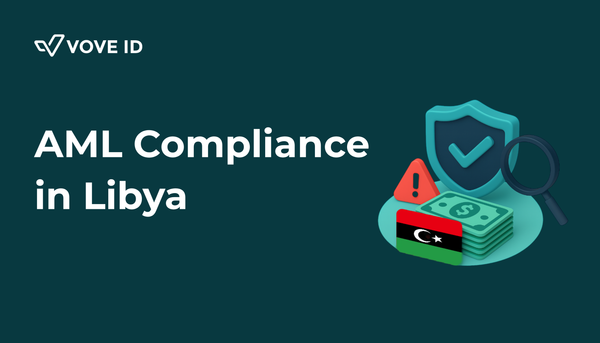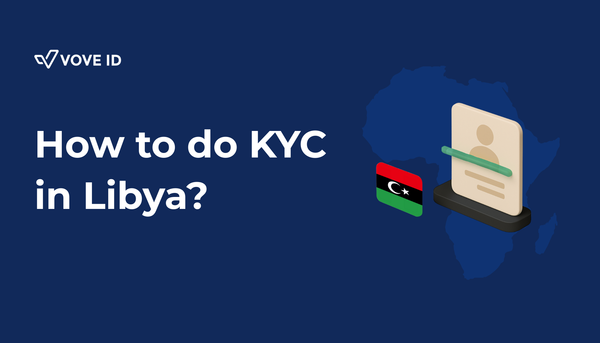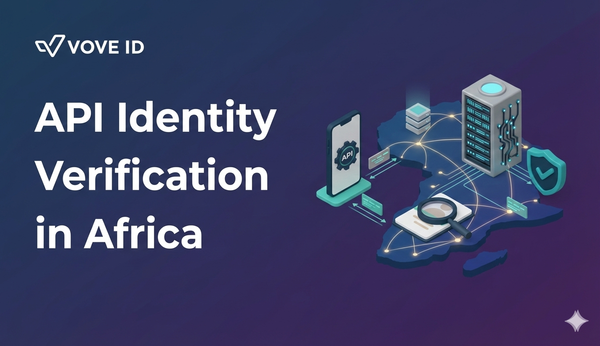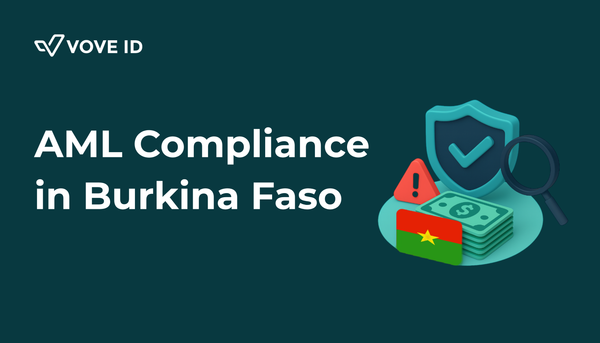How KYC Drives Egypt’s Financial Future in 2025
Master KYC Egypt with VOVE ID’s AI-powered solutions. Ensure identity verification Egypt, compliance, and fintech growth. Book a demo!
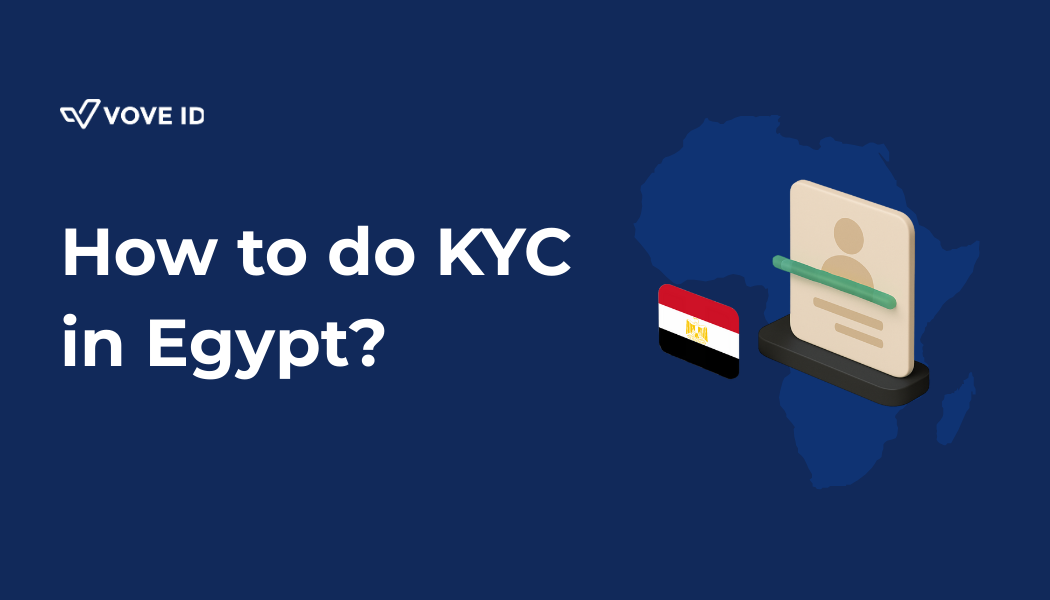
Egypt’s Fintech Surge and KYC’s Role
Egypt, a North African economic powerhouse with a GDP of $396 billion in 2023, is rapidly becoming a fintech hub. Cairo’s startup scene thrives, but risks like money laundering and fraud persist. KYC Egypt, Know Your Customer, ensures identity verification in Egypt aligns with the Anti-Money Laundering Law No. 80 of 2002, enforced by the Central Bank of Egypt (CBE) and Egyptian Money Laundering and Terrorist Financing Combating Unit (EMLCU). With Vision 2030 pushing digitalization, AI-driven KYC solutions like VOVE ID secure this growth.
What KYC Means for Egypt
KYC verifies customer identities to prevent financial crimes, mandated by the CBE and overseen by the Financial Regulatory Authority (FRA). From Alexandria’s SMEs to Giza’s mobile banking users, KYC fosters trust and complies with Middle East and North Africa Financial Action Task Force (MENAFATF) standards.
Why KYC Matters
Financial Impact of KYC in Egypt
KYC is critical for:
- Fraud Prevention: Illicit transactions cost Egypt billions annually, according to EMLCU reports, KYC blocks fake IDs.
- Compliance: CBE imposed significant fines in 2023 for AML breaches, per Central Bank statements.
- Trust: Verified users drive Egypt’s fintech sector, with startups raising nearly $800 million in 2022; 2023 saw continued growth, though exact figures are pending.
KYC supports Vision 2030’s financial inclusion goals, enabling secure digital banking.
KYC in Action: Cairo’s Fintech Boom
Consider NilePay, a fictional Cairo fintech created for illustration, offering mobile payments. As Egypt accelerates fintech innovation, ensuring robust KYC compliance from the start is key, VOVE ID makes that easier. NilePay verifies customers using Egypt’s National ID or passport and checks addresses via utility bills. Transactions over EGP 30,000 (~$970 USD) trigger EMLCU reporting, common in cities but tricky rurally, where ID coverage is limited, per CBE surveys. “KYC automation cut onboarding time by 75% while meeting CBE rules,” says NilePay’s compliance lead. Digital KYC with biometrics ensures AML compliance in Egypt.
How Egypt’s KYC Laws Compare
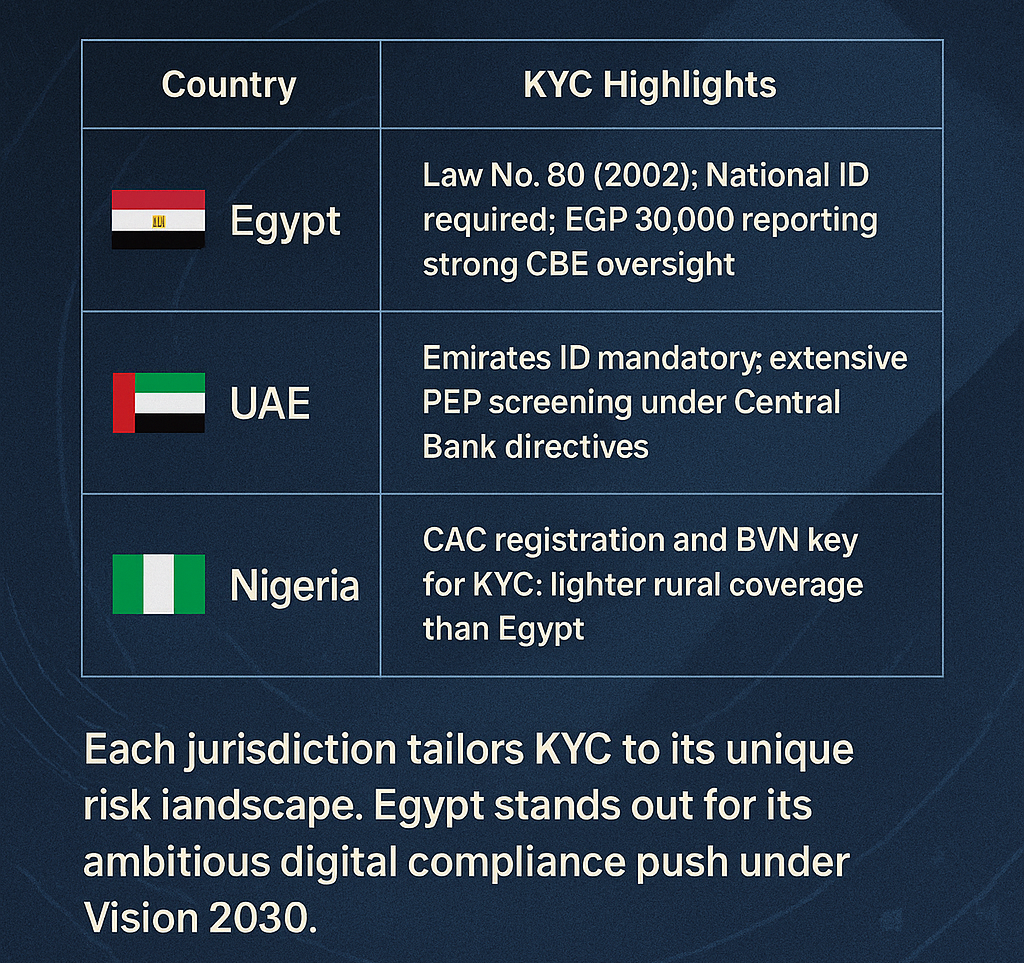
Key KYC Requirements
For KYC Egypt, businesses must collect:
- Identity Documents: National ID, passport, or driver’s license, AI validates against Ministry of Interior databases.
- Address Proof: Utility bill or lease agreement, under three months old.
- Enhanced Due Diligence (EDD): Extra checks for high-risk clients, like PEPs, per CBE guidelines.
- Screening: Cross-check MENAFATF, EMLCU sanctions, and global watchlists.
- Monitoring: Flag transactions exceeding EGP 30,000 for suspicious patterns.
How KYC Works
A solid KYC process includes:
- Data Collection: Gather name, ID number, and address details.
- Verification: AI matches IDs to official records, up to 95% accurate with quality data.
- Risk Assessment: Screen for sanctions or adverse media.
- Ongoing Monitoring: Track activity for red flags, like sudden large transfers.
Tech Powering KYC
AI and Biometrics in Egyptian KYC
AI revolutionizes identity verification in Egypt:
- Speed: Real-time ID checks shrink onboarding to seconds, vital for fintechs like Telda.
- Accuracy: Facial recognition with liveness detection confirms user authenticity, as seen in Banque Misr’s pilots.
- Scale: Digital systems align with EMLCU reporting.
VOVE ID’s AI tools streamline these checks. Egypt Post’s biometric KYC trials and e-KYC adoption by many fintechs, backed by CBE’s digital initiatives, signal a shift toward inclusive compliance.
Egypt’s KYC Framework
The Anti-Money Laundering Law No. 80 of 2002, amended in 2015, shapes KYC:
- EMLCU Oversight: Mandates due diligence and suspicious activity reports.
- AML Rules: Requires risk-based checks for remittances and forex.
- Data Protection: Law No. 151 of 2020 ensures data consent.
Egypt was placed on the FATF grey list in October 2023 for strategic AML/CFT deficiencies and remains under increased monitoring as of 2025, per MENAFATF, working to strengthen compliance. CBE’s 2023 report stated, “KYC is central to financial integrity.”
KYC Challenges
Egypt’s KYC landscape faces hurdles:
- Access Gaps: Rural ID coverage is limited, mobile KYC helps but needs scale, per CBE.
- Fraud: Synthetic IDs rise, AI counters but requires updates.
- Compliance Costs: KYC can cost SMEs significant annual sums, depending on their size and onboarding volume, per FRA estimates.
Benefits of Strong KYC
Effective KYC Egypt delivers:
- Credibility: Verified users boost Cairo’s fintech reputation.
- Growth: Fuels fintech investments by easing onboarding.
- Security: Cuts risks of fines and fraud, stabilizing markets.
Take Action
Navigating Egypt’s KYC landscape can be complex, but compliance doesn’t have to be a burden. VOVE ID provides seamless, automated KYC solutions designed to ensure compliance without compromising efficiency. Explore our tools today and future-proof your compliance strategy.

